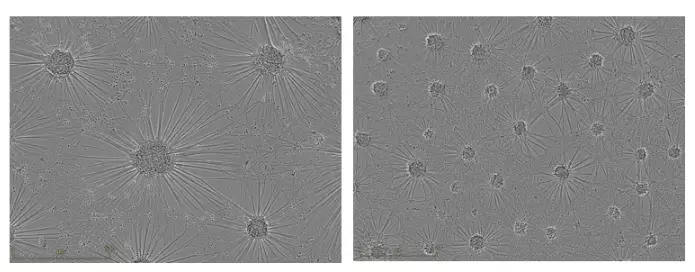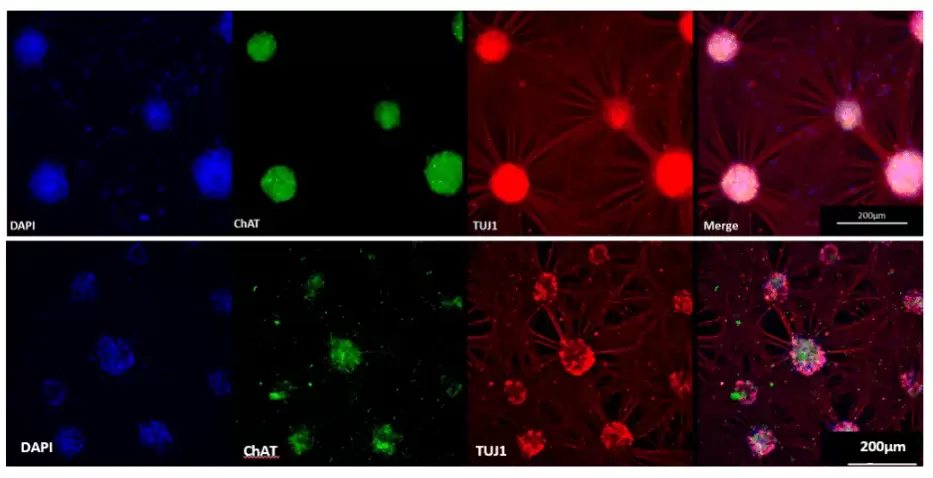axoCells Human iPSC-Derived Motor Neurons (female, ALS, C9orf72)
| Specifications | |
|---|---|
| Product Category: | iPSC-Derived Cells |
| Research Area: | Neuroscience |
| Cell Type: | Fibroblast |
| Donor Age: | 64 years |
| Donor Gender: | Female |
| Donor Ethnicity: | Caucasian (Ashkenazi) |
| Pathology: | Amyotrophic Lateral Sclerosis (ALS) |
| Reprogramming Method: | Sendai Virus |
Product Description
axoCells Human iPSC-Derived Motor Neurons for neuroscience research. Motor neurons made from iPSCs generated from a 64 year old symptomatic ALS (C9ORF72) female donor's dermal fibroblasts. iPSC-Derived Motor Neurons of a brother, also carrying the C9orf72 expansion but without ALS diagnosis at the time of sampling, are also available.
- Assay-ready in just 10 days
- Expression of the key markers including HB9, MAP2, LIM3 and ChAT2
- Designed for advanced in vitro model formats including co-culture and organ-on-chip platforms
- Manufactured in our ISO 9001-accredited production facility with excellent ISSCR Standards compliance
The repeat expansion of the parental iPSC line of the motor neuron progenitor was determined by Southern blot. C9orf72 is present in ~ 40% of familial ALS and 8-10 % of sporadic ALS. It is the most common mutation related to Amyotrophic Lateral Sclerosis (ALS) – far more common than SOD1 or TDP-43.
Additionally, the expansion was characterised using a PCR based approach. The experiment was carried out with standard genomic DNA extraction followed by AmplideX C9orf72 PCR expansion (AmplideX® PCR/CE C9orf72 Kit, Asuragen, Inc.). Sizing was performed separately by capillary electrophoresis. The AmplideX kit can characterize number of repeats accurately up to 145 and detect alleles with greater than 145 repeats. By using this kit, we have confirmed the C9orf72 extension present in our ax0074 motor neuron progenitors has greater than 145 GGGGCC repeats.
Supporting Data
ALS-derived motor neurons form smaller, less uniform bodies with thinner neurite extensions compared to healthy axoCells motor neurons.

Figure 1. Phase contrast images of mature axoCells motor neurons (day 21) from healthy (left, ax0078) and ALS (right, ax0074) background.
Compared to healthy axoCells motor neurons, ALS neurons form smaller, less uniform bundles, with thinner neurites. Healthy axoCells motor neurons form large, thick cabling between uniformly clustered bundles.

Figure 2. Immunocytochemistry of healthy control-derived axoCells motor neurons (top) and ALS-derived axoCells motor neurons (bottom) at day 21. Composite image for each channel and merged. Image captured on a Leica microscope at x20 magnification.
axoCells motor neurons exhibit synchronized burst firing, demonstrating their functional relevance.

Figure 3. axoCells motor neuron firing assessed at day 10 using the Axion Maestro Pro multi-electrode array (MEA) system. Here you can see sodium spike firing and network burst firing responses of the motor neurons.
Left: sodium spike profile, right: Raster plot showing burst firing events (blue boxes) with synchronized firing highlighted in pink boxes.
Limited License Terms
Axol Bioscience's Limited License TermsGenetically Modified Organism (GVO)
See General Terms.
Product Citations
- McCallister TX, Lim CKW, Terpstra WM, Alejandra Zeballos C M, Zhang S, Powell JE, Gaj T. (2023) A high-fidelity CRISPR-Cas13 system improves abnormalities associated with C9ORF72-linked ALS/FTD. BioRxiv
- Catalog Number
ax0074-GVO-AX - Supplier
Axol Bioscience - Size
- Shipping
Dry Ice

